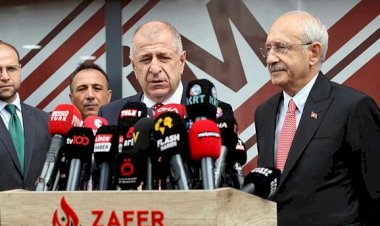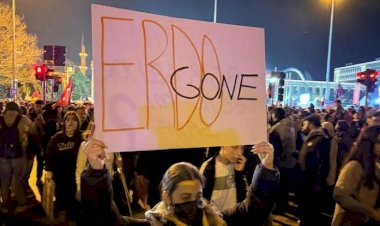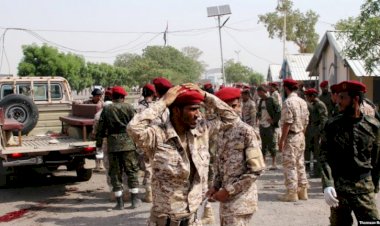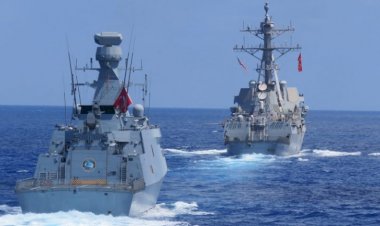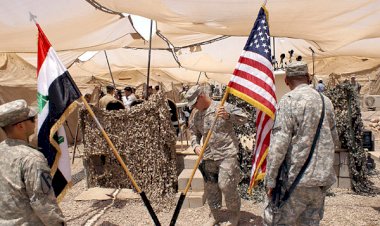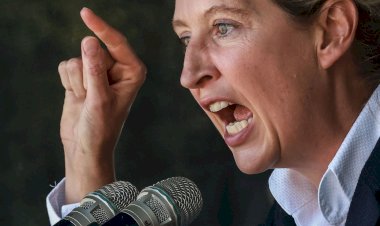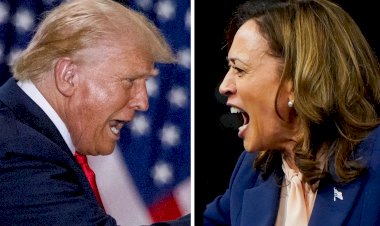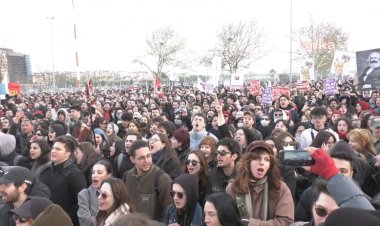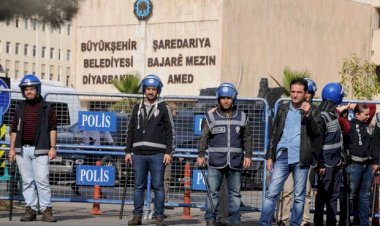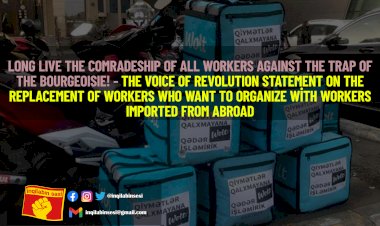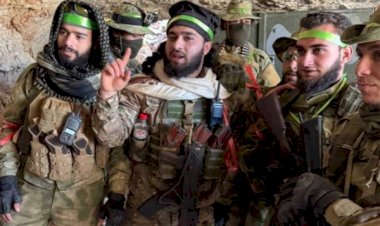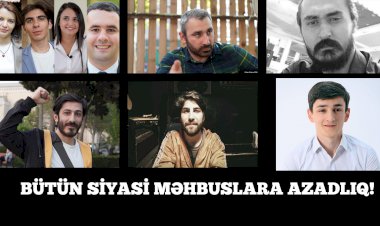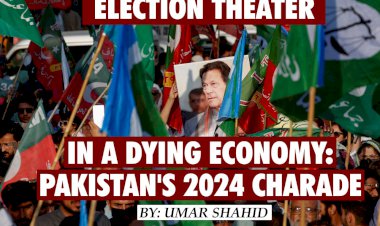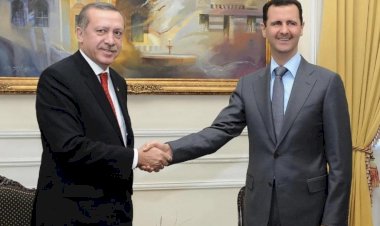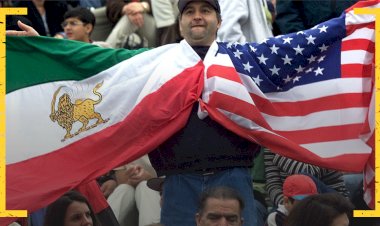Sami Adnan on Iraqi Rebellion: Our Time Has Come
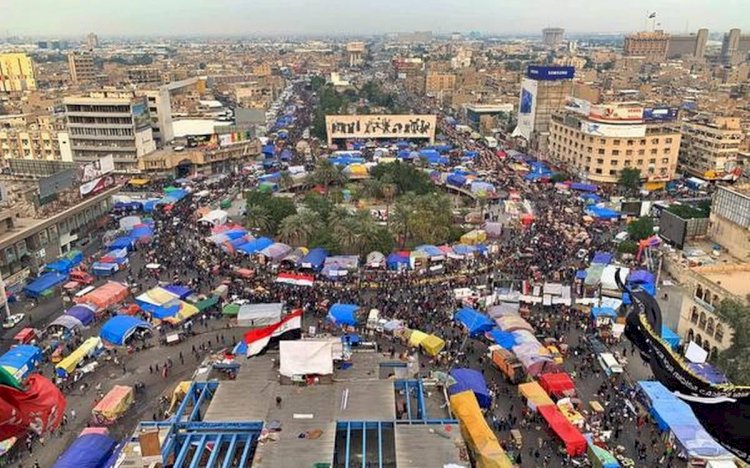
Sami Adnan is a revolutionary leading activist from Iraq. He co-founded Workers Against Sectarianism in Baghdad. Now, he plays an active role in advancing the work of the October Uprising Committee to bring activists together and make their voices heard inside and outside of Iraq.
What are the demands of the October movement and now at what stage is it?
People started protesting in October and the first and only demand is to change the political and economic system in Iraq. People want to change the Iraqi system, which is based on sectarianism, racism and Islamism. People want this to end because it's totally corrupt. This system brought us poverty, privatization, militias, security problems. And this system destroyed all structures, infrastructure and destroyed everything and killed all the dreams of the youth.
After 2003, when the US invaded Iraq. They did not build one hospital, one school. They did not build one real bridge to solve the traffic problem. They only opened the market in a very liberal way. And they stopped all the factories and agriculture in Iraq. And we lost everything. Also, because of the corrupted and sectarian system, people do not feel that they are represented. They don't feel like there is a state or system taking care of them. People don't feel that they are presented by any authority. Even the elections are just a game. Elections are rigged.
We have been living in a country without any insurance for our life and without any services such as health care, education system or universities. And people gathered all of these problems in one sentence that “throw out the system.” If one ask people, they answer: “We want a homeland.” What does that mean exactly? We are in a country that we don't have any possibility to live a normal life. Even, we are not safe. There are thousands and thousands of militia and terrorism and army and police. People see guards with arms in their hands at the doors of the schools when they send their children to school.
I ask one of the protesters spontaneously that “what do you want?” What would you mean by “we want the homeland”. He said, imagine I call this my country but I don't have a house to live and a school to go to or a hospital to get treatment or any kind of insurance or electricity or clean water to live. The neoliberal state doesn't care about us they don't even allow us to be workers and to work in our factories in. There is no job. There is no production. This system only wants to sell oil. Iraq import everything from China, Iran, Turkey and Saudi Arabia. We import everything: even food, vegetables, clothes… everything. We don't have any kind of industry. They destroyed it. Iraq once was one of the main industrial centers of the Middle East.
People still keep protesting. At the same time, the government, their militias, their Islamic political parties and gangs keep trying to control the movement. They keep trying to affect people and change the focus of the movement they try to make the people busy with changing prime ministers instead of changing the system itself. Although the protests are going down, people did not forget about the reasons for their protest.
Mask producer volunteers with the picture of Saraf al Saray, who was an unemployed engineer, a poet and a leder activist, killed by the police and became a symbol for the October Movement.
How has the global COVID-19 pandemic affected the revolutionary movement and people in Iraq?
The first thing to say it that the health system in Iraq is the worst. We were lucky that COVID-19 did not affect us really. But the coronavirus saved the government from the people. On April 1 the government initiated a curfew. Militia were deployed in the streets of cities and neighborhoods in order to oppress people. They used the curfew to save them from the revolution. At first the protesters did not believe that we had COVID-19 cases in Iraq. For us we don’t really care about dying from coronavirus because the government is already killing us and we are in a battle. There were some activists who are saying: we did not retreat from your snipers, we will not retreat because of a virus. We have 669 dead, 25,000 injured and 2,800 detainees, but we are still here. That was how people were thinking in the first 10 days of the coronavirus pandemic.
Then, as the cases increased in Iraq, we learned more about it, and how it was killing people, protesters began to think differently and many decided to leave the square. Only about 20 percent of the protesters stayed. In addition, the activists, who have stayed in the square, don’t meet anyone from outside the square,just stay inside their tents, and every day they sterilize the tents. They did not want to spread the virus throughout Baghdad and, as you know, Tahrir Square is in the middle of Baghdad. Our hospital on the square provides medical care and gives courses every day to educate protesters about the virus and the necessary hygiene measures.
While doing this, the activists in the Tahrir Square, continue to send political messages to the government, to the parliament, prime minister, militias, and to the political Islamic system. For example, when they selected Adnan al-Zurfi as the new prime minister, we had a march in Tahrir Square to show that we refused Zurfi. And five days ago when the government selected another new prime minister–Mustafa al-Kadhimi–even though our number was smaller, we protested him as well. This was the situation in Tahrir Square. I would also add that the protesters created a recent social media campaign that promise that the revolution will come back again after the coronavirus pandemic and the curfew ends.
From the side of economy, thing went bad because of the curfew. More than half of the population is unemployed, and most of them are young. And the other half is precarious workers and working in private sector. These precarious workers are paid day by day. So because of the curfew they are not able to even buy food for one month. Precarious workers lost their jobs and the government did not pay anything at all. And thanks to the solidarity among the poor people, families survived. Also, the violence against the woman raised to a very high that is a global reality. And two women suicided because of violence in Iraq.
How do the activists organize? What are the tools for organization? So, which parts of the society in Tahrir Square now? And what about the women take part in the movement?

People have really organized themselves. People clean and people protest. There is music to motivate people. There is a hospital with 10 beds. Some nurses and doctors help by teaching people first aid. There is medicine. Tuk tuks [small busses whose drivers are active protestors] work as ambulances. Women’s participation is also high, whether in medical care on the frontlines, or the writing of manifestos and statements, basically in everything. They lead protests and chants. It is an atmosphere of equality in the square. People are really building a civic and secular state. These women come from different religious backgrounds, Christian, Sunni, Shi’a, secular, and communist.
People find ways to express themselves also. They make graffiti. They play games with each other. Listen and dance to music. There is also a new beach, the Beach of Tahrir where people play volleyball. Also, there are many intellectual events and many libraries. They read, organize reading circles and discuss. There are schools where teachers teach students. There are also political events. There is a radio station. There are daily reports from other squares so that people can know about them. There are large dinner events. So they share food and get close. There are almost 1500 tents. The secular and leftist tents make up around 200 tents. There are other tents, where for example followers of Muqtada al-Sadr. There are also neighborhood tents and tribal tents. In each tent, around 4-5 people sleep.
Iraqi society is highly polarized and divided. So which parts of the society support the movement?
 When we say Iraqi society is polarized, we have to understand that there are many important reasons that make people go after or belong to these Islamic parties or militias. We have very huge unemployment and a very violent economy. It is because of the bad conditions. Were we a sectarian people, was the Iraqi people who like violence and belonging militias or ISIS before? Did Iraqi people hate each other before? Iraq was not even a religious society. When this sectarian rule came and divided people and brought this sectarianism into the society. When they came with their weapons and their money, they intentionally created this sectarian problems between the societies. And because of this huge unemployment problem, people were convinced to the joining the militias and army because they needed to live.
When we say Iraqi society is polarized, we have to understand that there are many important reasons that make people go after or belong to these Islamic parties or militias. We have very huge unemployment and a very violent economy. It is because of the bad conditions. Were we a sectarian people, was the Iraqi people who like violence and belonging militias or ISIS before? Did Iraqi people hate each other before? Iraq was not even a religious society. When this sectarian rule came and divided people and brought this sectarianism into the society. When they came with their weapons and their money, they intentionally created this sectarian problems between the societies. And because of this huge unemployment problem, people were convinced to the joining the militias and army because they needed to live.
All of that can change. But the current parties cannot do it. All of them are corrupt whether they are Sunni or Shia or Kurdish. They are trying to separating us and steal from people.
Nowadays, people just make jokes now about the sectarianism. It became a joke. It's end like one hundred percent for people. And when we see some sectarian events happened in Iraq, that's because of the parties, Islamic parties and their followers, not because of the people. It's never because of the people. And many uprisings happened from 2010 until 2020. And it is a clear and huge message to the world. We are all united against these rulers.
All different sectors of society take part in the movement because people from every identity reject this system. We have a new identity now. Before 2015, people were like saying all the time, I am Sunni and this is Shia etc.and they hug each other and record video of it. And we are all united against this sectarian system. Nobody even says I am Sunni and Shia anymore. What is important are the rights, social injustice and unemployment now. Different religious background doesn't matter anymore.
Tahrir square called for the new wave of protest on the 10th of May but there was a not a mass participation as far as we could see. What is the situation now?

It is true. There were not very much people on May 10, but I think there were more than 5,000 people. There are many reasons for it. First, there are not strong actors to organize it. Secondly, there are no clear alternatives to solve the problems which people protest. We have many martries, injured, kidnapped, imprisoned. But at this point, people questions a new escalation. We do not want our people to die but we want to win. So people believe that they have to get organized well and find a way before going out and burning and clashing. Some ask that “What is the point of going to the Green Zone?” Some people feel disappointed because the world did not support Iraqi people put the pressure on the government. They are disappointed about UN, EU or so. Our blood is very cheap for the world. And it seems that they do not care about what is happening in Iraq. So people feel they are lonely. Iraqi people sacrificed everything every time. This is not the first time. People raised up against the system in 2010, 2011, 2015, 2017 and 2020.
And even when some people say like, what is the alternative of the protestors? However, many activists learned from these uprisings and they learned how to protect themselves from other bourgeois tendencies. Now some of them are thinking to build their own party or organization, a committee to organize themselves in a better way with a clear alternative.
And let's see what will happen in the future. I am very optimistic and I am sure we will improve a lot.
In the middle of a new wave of struggle in Iraq, Lebanon and Iran, how can the movement in Iraq succeed?
 That’s a difficult question. And this is the problem of all the revolutionaries of the world. For Iraq, there are some basic problems to be solved. First, one is the unemployment. We have to organize the unemployed men and women. In addition, we have to organize and the protesters on the streets now. And of course, we have to organize the working class. If the movement had especially the workers in oil industry, it would be a very strong weapon of the movement. Thirdly, we have to build organizations of the progressive groups and activists in every level. This is very important.
That’s a difficult question. And this is the problem of all the revolutionaries of the world. For Iraq, there are some basic problems to be solved. First, one is the unemployment. We have to organize the unemployed men and women. In addition, we have to organize and the protesters on the streets now. And of course, we have to organize the working class. If the movement had especially the workers in oil industry, it would be a very strong weapon of the movement. Thirdly, we have to build organizations of the progressive groups and activists in every level. This is very important.
We don't want to be a dark spot in Middle East anymore. People want to see the solidarity of the people from other countries. We also can somehow support their movements especially around us. Especially we can build these connections in the Middle East. When we achieve this, the system, which rule the whole region, will become weaker.
As we have seen in the last months, quickly after the uprising happened in Iraq a very big uprising happened in Lebanon. What influenced peoples from Iraq to Beirut is the reality that one united revolution cannot be defeated. Why? Because we felt that is the same political Islamic system ruling the Middle East from Iran to Beirut. Even the same militias with the same name with the same money... The same money comes from the same banks of Iran and flows into Baghdad, Syria and Lebanon.
Moreover, I think this is the only way we can make change. It needs a lot of work, many struggles but nothing is impossible.
The US invasion to Iraq caused deep destruction and changed everything in Iraq. Can you explain to us the relation between the US occupation regime and the current problems of Iraqi people suffer from?
 And yes, I think it's very important to talk about the U.S. rule in Iraq. After occupation, they destroyed all economy but before the occupation, Saddam Huseyin had already privatized some factories.
And yes, I think it's very important to talk about the U.S. rule in Iraq. After occupation, they destroyed all economy but before the occupation, Saddam Huseyin had already privatized some factories.
And things even got harder under American war economy. Paul Bremer dissolved the political system and reestablished it: they supported the current sectarian constitution and militias by providing them facilities and construction contracts. These contracts were great economic funds for Islamic parties. And their power increased in Iraqi society.
We were already suffering from the miserable system of Saddam Hussein and a miserable economy. Our working class was living in the worst conditions. And that was a good material for these parties to these poor people recruit in their parties and for some money. And this point became the starter of the militias for the USA and all the corruption became possible with this structure of the USA rule. The US is one hundred percent responsible for our current problems.
Although Iraq had a big budget, they stopped funding the factories of Iraq and they used this money to support corrupt regimes not the people, not to build infrastructure, not the farmers. That money was wasted for corrupt parties to build militias to oppress people. And Paul Bremer officially brought privatizations and World Bank to Iraq and wrote it in the constitution and called it a liberal economy.
They sold the public sector because of the privatization but to whom? To the Islamic parties. The allowed them to control whole public and private sectors. They control the people, airports, factories, hospitals, schools, universities, streets, bridges, electricity and water. These are the direct consequences of the USA policy in Iraq.
USA started everything and Iran get the benefit of it at the end. USA brought us to sectarianism, sectarian constitution, the new liberal system, privatizations. They did it.
Can you talk about your group Workers Against Sectarianism? When was it established? What are your political goals?
Our group Workers Against Sectarianism (WAS) is established in 2019. But all of us are old activists from different places of Iraq. We are struggling against sectarianism on which the state-based. Because of the sectarian system, there are militias, terrorism, corruption. Our lives and dreams are destroyed.
Sectarianism cracks the working class inside and prevents the workers to be united. Sectarianism builds walls between the workers. It even create racism. Because of the sectarianism, we, the working class, could not understand who the real enemy was.
So we, a group of activists, who have been in the struggle since 2010 in different ways, decided to establish a group in 2019. Not all of us, but we all have a left progressive background. We are a young and fresh group. We are not an academic or intellectual group. We are around 20 people who decided to change the system which cause all this misery.
And we have three goals that we united around. We want job and unemployment insurance. And we want this sectarian system to end. We want to build the solidarity networks around the World and especially in the region. Lastly, we try to deliver our alternative voice of revolution to the world in English. We want the world to know that there are also progressive elements in Iraqi society and we make a change here. We want to deliver another alternative voice of our Revolution and our political dedication. We will make interviews with other groups, committees and parties.We will make a lot of political report articles podcasts, videos and a lot of other stuff in English.
We call ourself a revolutionary group. We try to educate and organize ourselves more and to do more. We're really looking forward to do a lot in the future. And October uprising inspires us a lot. We were part of it. We made a tent on Tahrir square and we were participating in the meetings between the tents and part of this struggle.
Our world witnesses a new generation of popular struggles in every continent. Before the outbreak, streets of the world were filled with anger and uprisings. In the middle of a newly rising wave of struggle in Iraq, what do you want to say to the laborers around the World?
 People make objections. In Chile, Hong Kong, Lebanon, Iran, Egypt, Algeria, Tunisia and Yellow Vests in France. Great magical feelings. It touched a lot of people around the world. I remember when yellow vests started protesting in France I saw a lot of people influenced by them and wearing yellow vests and gathered in Tahrir Square. And I was one of them. This means one thing: We are one class and our struggle is one.
People make objections. In Chile, Hong Kong, Lebanon, Iran, Egypt, Algeria, Tunisia and Yellow Vests in France. Great magical feelings. It touched a lot of people around the world. I remember when yellow vests started protesting in France I saw a lot of people influenced by them and wearing yellow vests and gathered in Tahrir Square. And I was one of them. This means one thing: We are one class and our struggle is one.
What we need to be united more than anything. We need to know each other to change this world. Because capitalism cannot answer our needs in Iraq, in Chile, in France and in any place in the world.
Capitalism only can give temporary solutions. It cannot bring a system without wars in the Middle East, without diseases and hunger in Africa and without oppression in China without dictatorships in the world. We cannot continue with this imperialist system which colonize the wealth and kill people for that.
And only the working class can reject this. This is the only class that has the ability to lead to a just, equal, peaceful and humane world.
In Iraq, we continue our struggle and we will. Just for now, it seems that maybe the October Uprising came to an end. But wait the Iraqis wait for the next uprising. You will be surprised in 2020 more than you surprised in 2019 in October. You'll see the greatest struggle. And we will see them in your countries too. This time capitalism is collapsing. Our time has come.




